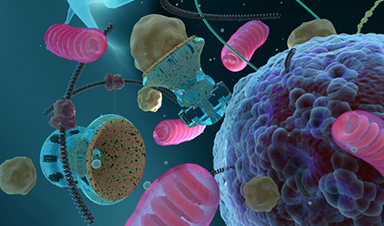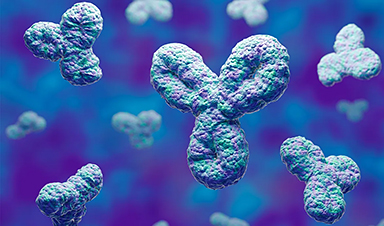Future nanomedical devices and systems will have strong potential to enable a broad range of aerospace and space applications. With further dimensional reductions in conjunction with the increased capabilities of nanoelectronics and artificial intelligence (AI), nanomedicine may facilitate the development of a wide array of advanced nanomedical diagnostic and therapeutic capabilities dedicated to the health and well being of future astronauts and space pioneers, the inhabitants of future Lunar and Mars colonies, and deep space explorers. These nanomedical innovations may form the core elements of advanced extravehicular space suits that have numerous advantages, such as continuous real-time health monitoring, virtually instantaneous in situ diagnostics, the auto-administration of therapeutics, and the capacities to address serious accidental circumstances and performance of emergency interventions.
Recent News
Specially engineered antibody delivers RNA therapy to treatment-resistant tumors
Elias Quijano, PhD; Diana Martinez-Saucedo, PhD; Zaira Ianniello, PhD; and Natasha Pinto-Medici, PhD, there are 25 other contributors, most from Yale's Department of Therapeutic Radiology and from the departments [...]
Vaccinated women face fewer cervical cancer risks
New data from Denmark shows the HPV vaccine’s powerful long-term impact, while also revealing why cervical cancer screening is still essential. A Danish study published in the journal Eurosurveillance reports that [...]
3D-printed implant offers a potential new route to repair spinal cord injuries
A research team at RCSI University of Medicine and Health Sciences has developed a 3-D printed implant to deliver electrical stimulation to injured areas of the spinal cord, offering [...]
Nanocrystals Carrying Radioisotopes Offer New Hope for Cancer Treatment
The Science Scientists have developed tiny nanocrystal particles made up of isotopes of the elements lanthanum, vanadium, and oxygen for use in treating cancer. These crystals are smaller than many microbes [...]
New Once-a-Week Shot Promises Life-Changing Relief for Parkinson’s Patients
A once-a-week shot from Australian scientists could spare people with Parkinson’s the grind of taking pills several times a day. The tiny, biodegradable gel sits under the skin and [...]
Weekly injectable drug offers hope for Parkinson’s patients
A new weekly injectable drug could transform the lives of more than eight million people living with Parkinson's disease, potentially replacing the need for multiple daily tablets. Scientists from [...]
Most Plastic in the Ocean Is Invisible—And Deadly
Nanoplastics—particles smaller than a human hair—can pass through cell walls and enter the food web. New research suggest 27 million metric tons of nanoplastics are spread across just the [...]
Repurposed drugs could calm the immune system’s response to nanomedicine
An international study led by researchers at the University of Colorado Anschutz Medical Campus has identified a promising strategy to enhance the safety of nanomedicines, advanced therapies often used [...]
Nano-Enhanced Hydrogel Strategies for Cartilage Repair
A recent article in Engineering describes the development of a protein-based nanocomposite hydrogel designed to deliver two therapeutic agents—dexamethasone (Dex) and kartogenin (KGN)—to support cartilage repair. The hydrogel is engineered to [...]
New Cancer Drug Blocks Tumors Without Debilitating Side Effects
A new drug targets RAS-PI3Kα pathways without harmful side effects. It was developed using high-performance computing and AI. A new cancer drug candidate, developed through a collaboration between Lawrence Livermore [...]
Scientists Are Pretty Close to Replicating the First Thing That Ever Lived
For 400 million years, a leading hypothesis claims, Earth was an “RNA World,” meaning that life must’ve first replicated from RNA before the arrival of proteins and DNA. Unfortunately, [...]
Why ‘Peniaphobia’ Is Exploding Among Young People (And Why We Should Be Concerned)
An insidious illness is taking hold among a growing proportion of young people. Little known to the general public, peniaphobia—the fear of becoming poor—is gaining ground among teens and [...]
About NanoApps Medical Inc

NanoApps Medical, Inc. was incorporated by Frank Boehm in 2009 with the goal of developing advanced nanomedical diagnostic and therapeutic technologies for the benefit of individuals across both the developing and developed worlds.
The larger picture will be to eventually attain a situation of “Global Health Care Equivalency” (GHCE) where any individual on the planet may have access to the same advanced, high quality, and cost effective nanomedical diagnostic and therapeutic technologies, no matter where they happen to reside, or under what conditions they live. Boehm is now compiling a book that will articulate this grand vision.
Further, NanoApps Medical is ambitiously aiming to transition terrestrial nanomedicine to space applications to facilitate future Lunar and Mars missions, such as those being boldly planned by NASA and SpaceX.











